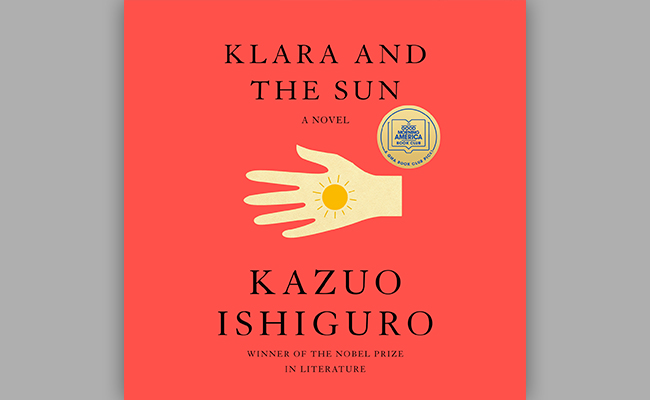It’s time for our Book Clubbin’ blog feature! Lockdowns and social distancing don’t mean you can’t start up a book club with your pals. Just book an hour (or more if the discussion gets heated) to meet every month through video chat!
This month, we’re diving into Nobel laureate Kazuo Ishiguro’s latest novel, Klara and the Sun, narrated by Sura Siu. At once tender and thrilling, Klara and the Sun is a magnificent entry into Ishiguro’s body of work.
Ishiguro’s eighth novel, the first after he was awarded the Nobel Prize for Literature in 2017, introduces a uniquely unforgettable narrator in Klara, an Artificial Friend. From her vantage in the store, she carefully watches the behavior of those who come in to browse, and of those who pass in the street outside. She remains hopeful a customer will soon choose her, but when the possibility emerges that her circumstances may change forever, Klara is warned not to invest too much in the promises of humans. Those familiar with Ishiguro’s work will see tendrils of familiarity in his discussions of humanity and servitude that he first explored in Never Let Me Go.
No matter if you’re a first-time reader or an Ishiguro devotee, this month’s pick will surely spark complex discussions about the nature of love, sentience, and the human condition. Beware— SPOILERS ahead.

—————CONTAINS SPOILERS!————
1) In Klara and the Sun, Kazuo Ishiguro imagines not a world where AI rebellion is inevitable, as so many science fiction novels and movies have warned, but rather that it is not and may never be. What kind of threat do you think he is highlighting, instead, with the placid servitude and expendability of Klara and other AFs (Artificial Friends)?
2) Ishiguro keeps the narrative tightly constrained to Klara’s point of view. What do her naiveté and unique observations add to the story?
3) Discuss how the theme of loneliness comes up in the story and some of the ways AFs both combat and exacerbate loneliness.
4) What are your thoughts on the society Ishiguro created in which “lifted” children are afforded better opportunities and, in turn, a vastly different lifestyle than those who aren’t “lifted?” How does this compare with the world we currently live in?
5) During Josie’s interaction meeting when the boys want to throw Klara around to test her coordination, one of the girls says it’s “evil” and “nasty” to handle an AF that way. What did you make of the children’s different sentiments toward AFs? What about Klara’s response, or, rather, lack thereof?
6) What did you make of Klara’s visit to Morgan’s Falls with the Mother? Did it change your opinion of either of them?
7) If things had gone differently and Josie’s parents carried through with their plan, do you think either of them could ever have accepted Klara as Josie’s replacement?
8) If it came to it, is it something you would ever consider doing?
9) Why, in the end, do you think Ishiguro chose for Josie to recover from her illness?
10) What do you think Ishiguro is saying about the uniqueness of humans? What about robots? Does he offer any definitive conclusions?
New to Audiobooks.com? Get your first book free, PLUS a bonus book from our VIP selection when you sign up for our one-month free trial. Digital audiobooks make audible stories come to life when you’re commuting, working out, cleaning, cooking, and more! Listening is easy with our top-rated free audiobook apps for iOS and Android, which let you download & listen to bestselling audiobooks on the go, wherever you are. Click here to get your free audiobooks!


